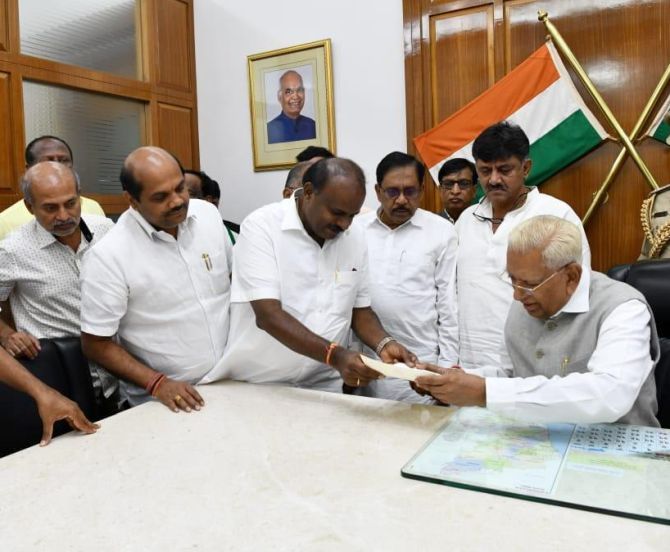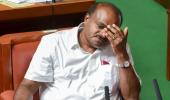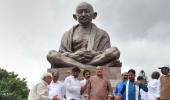'The leaders of the two parties, the rank and file, and even their respective vote banks are passionately opposed to each other.'
'At the top, between the leaders, it is personal, bitter and hostile.'
'This was not going to work. Everyone knew it.'

With the fall of the 14-month-old Congress-Janata Dal-Secular coalition government in Karnataka, another chapter begins with the Bharatiya Janata Party's Bookanakere Siddalingappa Yeddyurappa all set to form the next government.
"We don't know if a BJP rule will be any better, but it is rare for Karnataka, in 40 years or so, to get a state government which is ruled by the party that also governs the Union," Prakash Belawadi, below, activist, actor and theatre personality, tells Rediff.com's Shobha Warrier.
Do you think the curtain has fallen on the first act of the drama? Or, is it going to be the beginning of a new drama?
There are two immediate questions to settle for Speaker Ramesh Kumar before we can even hope for a stable new government.
First, for how long will the rebel MLAs continue to be members of the assembly?
If the speaker does not accept the resignations, he has to disqualify them immediately for violating the whip to be present in the assembly and vote for the government.
If he delays the decision, then the rebels will play hard to get, bargain for positions and keep both the BJP and the Congress-JD-S in suspense.
Second, if he does accept the resignations, would that status apply from the date of submission of the resignation letters?
In which case, the rebels could argue before the Supreme Court that the whip issued to them to be present in the House and support the vote of confidence wouldn't apply.
They would escape disqualification and soon contest from their own constituencies again in the ensuing by-elections.
The Congress-JD-S combine, burnt and bitter, cannot allow for such eventuality.
Common sense would suggest that they have to be disqualified.
Even if the speaker does disqualify them, the rebels will contest the decision before the Supreme Court, because they can claim that the court, by ordering that they couldn't be 'compelled' to attend the House while the speaker sits on their resignation letters, has given them immunity from the whip.
It's not as though the speaker has all the time he wants to decide on the resignations.
It's possible that the first thing a newly sworn-in Yeddyurappa government will do is move a no-confidence motion against the speaker himself.
So, the uncertainty and, possibly, the drama continues.
Is there anything in this drama for the BJP to cheer about?
All the way, uncertainty or otherwise.
 The worst, and unlikely, the result the Yeddyurappa-led state BJP could expect is imposition of President's rule in Karnataka; in which case, the Modi government will take direct charge of the state, through the governor, and prepare a favourable ground over six months for the ensuing by-elections.
The worst, and unlikely, the result the Yeddyurappa-led state BJP could expect is imposition of President's rule in Karnataka; in which case, the Modi government will take direct charge of the state, through the governor, and prepare a favourable ground over six months for the ensuing by-elections.
The likelier option is that the rebels will be disqualified sooner than later and, while they fight their case in court, Yeddyurappa will be invited to form the government with a truncated assembly where he enjoys a small majority for now. He will hope the improve his position in the by-elections at the constituencies of the rebels.
Fresh from the triumphant Lok Sabha polls in Karnataka, where the BJP got over 50 percent of the popular vote, Yeddyurappa might not be anxious though.
Can we call what Karnataka witnessed in the last one year was the result of an unholy alliance?
Coalitions are a reality in India, for sure, since 1989. If there were ethical questions to be posed to this sad coalition, they would have to be applied to every post-poll alliance where parties go before the voters opposing and abusing each other, but gang up for numbers, after the polls.
So, I wouldn't agree with the word 'unholy'. Rather, I would say it was untenable.
The leaders of the two parties, the rank and file, and even their respective vote banks are passionately opposed to each other.
At the top, between the leaders, it is personal, bitter and hostile.
This was not going to work. Everyone knew it.
The surprise is that it survived this long.
When we spoke in May 2018, you had said that even if the Congress and the JD-S came together, it would be unstable from the word go. Should this have been avoided?
Well, as I said, it was the evident at the very beginning....
Do you feel it is time we stop post-poll alliances? It appears most of the legislators from Karnataka spent more time hiding in various hotels than in the assembly.
It is deeper than that.
If I may trespass into lawyerly ground, I would say the 10th Schedule of the Constitution is the real problem. It doesn't answer the real question here.
If an elected representative has an ethical issue with his party or party government, should s/he not act according to her/his conscience?
To be disqualified for that alone suggests the elected representative is more obliged to the party than to the voter.
How can that be? Have we made a law against the possible best person to protect a possible bad or worse government?
In any case, since apologists for the 10th Schedule always get so morally shrill, I will say it is poetic justice that this law is subverted so often, and usually by the worst, with resorts, bribes and inducements.
With the least number of seats among the three major parties, do you think the JD-S had the moral right to rule the state?
Moral right is a difficult value in our politics, but the coalition was perfectly legal.
It's just that Mr Kumaraswamy could not reconcile his and his family's high ambitions with the political realities on the ground.
In the game the three political parties played in the last 14 months, who played the dirtiest game, according to you?
Hard to pick because the ruling parties failed to evolve a decent common agenda of governance or keep 'coalition dharma', and the BJP, instead of playing the role of a responsible Opposition, kept making attempts to topple the government with defections.
Do you feel with a few seats short of majority, Yeddyurappa had the mandate to rule the state?
No, but since the law favours the number of seats won, and not greater vote share, he always was within striking distance; he did strike often and, this time, successfully.
Do you think the number of seats the BJP won in the Lok Sabha election was because people were frustrated with the drama that unfolded after the assembly election?
A combination of things, but mainly, a dysfunctional coalition and the Modi phenomenon.
How do you describe the last one year of politics in Karnataka?
A mess, really depressing.
We don't know if a BJP rule will be any better, but it is rare for Karnataka, in 40 years or so, to get a state government which is ruled by the party that also governs the Union.
So, we hope for a shared vision, better coordination and some discipline.










